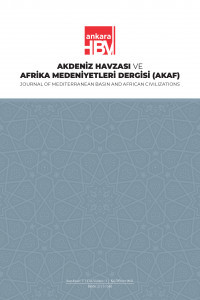TÜRKİYE'S FOREIGN AID TO AFRICA UNDER AK PARTY: A CONSTRUCTIVIST APPROACH
Türkiye, Africa, Ak Party, Foreign Aid, Constructivism.
TÜRKİYE'S FOREIGN AID TO AFRICA UNDER AK PARTY: A CONSTRUCTIVIST APPROACH
Türkiye, Africa, Ak Party, Foreign Aid, Constructivism.,
___
- ALI, Abdirahman (2011), “Turkey's Foray into Africa: A New Humanitarian Power?”, Insight Turkey, pp. 65- 73.
- ANAZ, Necati & AKMAN, Emre (2017), “Turkey's Soft Power Capacity: Geopolitics of Aviation and The Turkish Airlines”, The Arab World Geographer, pp. 303-316.
- ÇUHADAR‐GÜRKAYNAK, Esra & ÖZKEÇECI‐TANER, Binnur (2004), “Decision-making Process Matters: Lessons Learned from Two Turkish Foreign Policy Cases”, Turkish Studies, pp. 43-78.
- DONELLI, Federico (2017), “Features, Aims and Limits of Turkey's Humanitarian Diplomacy”, Central European Journal of International & Security Studies, pp. 38- 58.
- DUNNE Tim, KURKI Milja & SMITH, Steve (2007), International Relations Theories: Discipline and Diversity, Oxford University Press, Oxford.
- İNAÇ, Hüsamettin, HADJI, Aymene & BENMANSOUR, Younes (2022), “The Prospect for Turkish Foreign Policy in Africa Under AK Party Governments”, Afro Eurasian Studies, pp. 148-164.
- KAVAS, Ahmet (2006), “Osmanlı-Afrika İlişkileri” https://tasam.org/tr-TR/Icerik/383/osmanli-_afrika_iliskileri (Accessed on 20th November 2022).
- OBA, Ali, E. (2011) “Türk Diplomasisi ve Afrika” https://tasam.org/tr-TR/Icerik/1359/turk_diplomasisi_ve_afrika (Accessed on 20th November 2022).
- OECD (2022), "Turkey", In Development Co-Operation Profiles, OECD Publishing, Paris, https://doi.org/10.1787/714276e8-en (Accessed on 20th November 2022).
- ORUÇ, Ali (2022), “Türkiye'nin Afrika Stratejisinin Dış Ekonomik İlişkiler Bağlamında Değerlendirilmesi ve Öneriler”, Cumhurbaşkanlığı, Strateji ve Bütçe Başkanlığı, İSEDAK ve Ulusal Kalkınma İş Birliği Genel Müdürlüğü, Ankara.
- ÖZKAN, Mehmet (2018), “Turkey in South—South Cooperation: New Foreign Policy Approach in Africa”, Vestnik Rudn: International Relations, pp. 565-578.
- ÖZKAN, Mehmet & AKGÜN, Birol (2010), “Turkey's Opening to Africa”, The Journal of Modern African Studies, pp. 525-546.
- ÖZKAN, Mehmet & ORAKCI, Serhat (2015), “Viewpoint: Turkey as a “Political” Actor in Africa – An Assessment of Turkish Involvement in Somalia”, Journal of Eastern African Studies, pp. 343-352.
- REPUBLIC OF TÜRKIYE MINISTRY OF FOREIGN AFFAIRS OFFICIAL WEBSITE (2022), “Afrika Ülkeleri ile İlişkiler” http://www.mfa.gov.tr/turkiye-afrika-iliskileri.tr.mfa (Accessed on 20th November 2022).
- SIRADAG, Abdurrahim (2015), “Benevolence or Selfishness: Understanding the Increasing Role of Turkish NGOs and Civil Society in Africa”, Insight on Africa, pp. 1-20.
- TURHAN, Yunus (2021/1), “Turkey’s Foreign Policy to Africa: The Role of Leaders’ Identity in Shaping Policy”, Journal of Asian and African Studies, pp. 1329–1344.
- TURHAN, Yunus (2021/2), “Turkey’s Foreign Aid to Africa: An Analysis of The Post-July 15 Era”, Journal of Balkan and Near Eastern Studies, pp. 795-812.
- TURHAN, Yunus. “Türkiye Sahra-Altı Afrika İlişkileri: Ekonomik Ortaklıktan Stratejik Ortaklığa”. İçinde: Kalaycı, Rıdvan ve Akdoğan, İsmail 21. Yüzyılda Türkiye'nin Ortadoğu Ülkeleri ve Büyük Güçlerle İlişkileri, (Orion Kitapevi Yayınları, 2021/3), pp. 463-484.
- WALKER, Joshua W. (2007) “Learning Strategic Depth: Implications of Turkey’s New Foreign Policy Doctrine”, Insight Turkey, pp. 32–47.
- WASUGE, Mahad (2016), “Turkey’s Assistance Model in Somalia: Achieving Much with Little” http://www.heritageinstitute.org/wp-content/uploads/2016/02/Turkeys-Assistance-Model-in-Somalia-Achieving-Much-With-Little1-1.pdf (Accessed on 20th November 2022).
- WENDT, Alexander (1992), “Anarchy is What States Make of İt: The Social Construction of Power Politics”, International Organization, pp. 391-425.
- WENDT, Alexander (1999), Social Theory of International Politics, Cambridge University Press, Cambridge. YAHYA GOUDJA, Oumar (2021), “Afrika’nın Değişen Jeopolitiğinde Türkiye’nin Rolü”, Akdeniz Havzası ve Afrika Medeniyetleri Dergisi, pp. 115-123.
- YURDUSEV, Nevzat (2010), “Osmanlı Mirası ve Türk Dış Politikası Üzerine”, Uluslararası IV. Türk Dış Politikası Sempozyumu Tebliğleri, 11 Mart 2010, Dinçer, Özdal, & Necefoğlu, Uluslararası Stratejik Araştırmalar Kurumu Publication, Ankara, pp. 47-54.
- ISSN: 2717-7548
- Yayın Aralığı: Yılda 2 Sayı
- Başlangıç: 2019
- Yayıncı: Ankara Hacı Bayram Veli Üniversitesi
NİJERYA'DA SEÇİMLERİN ASKERİLEŞTİRİLMESİ: DEMOKRATİK BÜYÜME İÇİN BİR BANE
TÜRKİYE'S FOREIGN AID TO AFRICA UNDER AK PARTY: A CONSTRUCTIVIST APPROACH
ABBASİLER DÖNEMİ (H.255-270/MS.869-883) BAĞDAT’TA ZENCİ İSYANI ve ALİ B.MUHAMMED’İN ROLÜ
YENİDEN MİLLİ MÜCADELE DERGİSİNDE AFRİKA (1970-1980)
Don Juan Manuel'in Eserlerinde İslâm Kültürü ve Müslümanlar
İYİLİK YÜREK İSTER: “İYİLİK YOLUNDA ETİYOPYA”, FECR YAYINLARI: ANKARA
